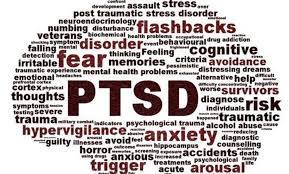Virtual Resources by Shelly Hohl, LPC
June is PTSD Awareness Month
PTSD is a mental health problem that some people develop after experiencing or witnessing a traumatic event, like combat, a natural disaster, a car accident, or sexual assault. It’s normal to have upsetting memories, feel on edge, or have trouble sleeping after this type of event. If symptoms last more than a few months, it may be PTSD. The good news is that there are effective treatments.
According to the National Center for Post-Traumatic Stress Disorder, about 60 percent of men and 50 percent of women will experience a traumatic event in their lifetime and the numbers are even higher for members of the armed forces.
(National Center for PTSD, 2013)

How Common is PTSD in Adults?
Posttraumatic stress disorder (PTSD) can occur after you have been through a trauma. A trauma is a shocking and dangerous event that you see or that happens to you. During this type of event, you think that your life or others’ lives are in danger.
- About 6 of every 10 men (or 60%) and 5 of every 10 women (or 50%) experience at least one trauma in their lives. Women are more likely to experience sexual assault and child sexual abuse. Men are more likely to experience accidents, physical assault, combat, disaster, or to witness death or injury.
- PTSD can happen to anyone. It is not a sign of weakness. A number of factors can increase the chance that someone will develop PTSD, many of which are not under that person’s control. For example, if you were directly exposed to the trauma or injured, you are more likely to develop PTSD. (National Center for PTSD, 2021)
Take a Self-Screen for PTSD
A screen is a short set of questions to help you know if it is likely you might have PTSD. Below is the Primary Care PTSD Checklist for DSM-5, or the PC-PTSD-5 screen.
Primary Care PTSD Checklist for DSM-5
Sometimes things happen to people that are unusually or especially frightening, horrible, or traumatic. For example:
- a serious accident or fire
- a physical or sexual assault or abuse
- an earthquake or flood
- a war
- seeing someone be killed or seriously injured
- having a loved one die through homicide or suicide
Have you ever experienced this kind of event? YES / NO
If no, screen total = 0. Please stop here.
If yes, please answer the questions below:
In the past month, have you …
- Had nightmares about the event(s) or thought about the event(s) when you did not want to? YES / NO
- Tried hard not to think about the event(s) or went out of your way to avoid situations that reminded you of the event(s)? YES / NO
- Been constantly on guard, watchful, or easily startled? YES / NO
- Felt numb or detached from people, activities, or your surroundings? YES / NO
- Felt guilty or unable to stop blaming yourself or others for the event(s) or any problems the event(s) may have caused? YES / NO
If you answer “yes” to any 3 items (items 1 to 5 above), you should talk to a mental health care provider to learn more about PTSD and PTSD treatment.
Answering “yes” to 3 or more questions on the PC-PTSD-5 does not mean you have PTSD. Only a mental health care provider can tell you for sure. And, if you do not answer “yes” to 3 or more questions, you may still want to talk to a mental health care provider. If you have symptoms that last following a trauma, treatment can help—whether or not you have PTSD. (National Center for PTSD)
Partnerships
Resources/More Information:
National Alliance on Mental Illness (NAMI)
Veterans Crisis Line: 1-800-273-8255 or text to 838255
Josephine County 24 hr. crisis line: 541-474-5360
Jackson County 24 hr. crisis line: 541-774-8201

